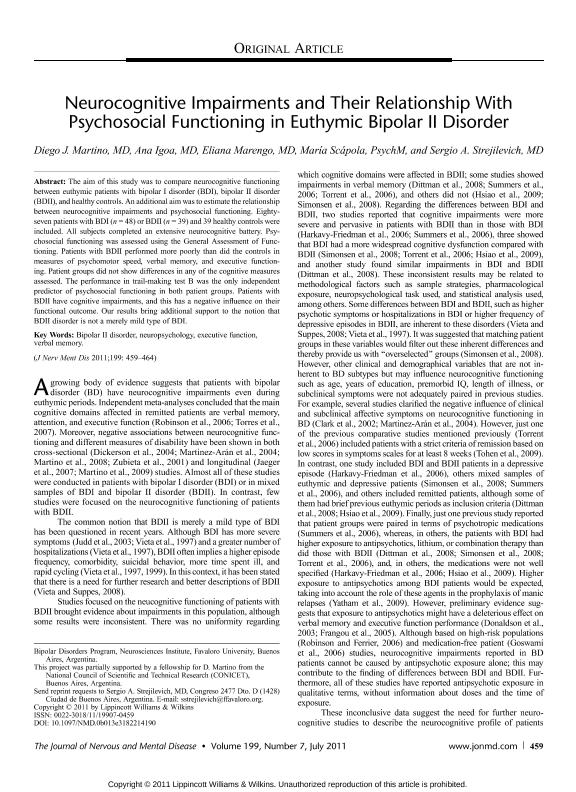Artículo
Neurocognitive impairments and their relationship with psychosocial functioning in euthymic bipolar II disorder
Fecha de publicación:
07/2011
Editorial:
Lippincott Williams
Revista:
Journal Of Nervous And Mental Disease
ISSN:
0022-3018
Idioma:
Inglés
Tipo de recurso:
Artículo publicado
Clasificación temática:
Resumen
The aim of this study was to compare neurocognitive functioning between euthymic patients with bipolar I disorder (BDI), bipolar II disorder (BDII), and healthy controls. An additional aim was to estimate the relationship between neurocognitive impairments and psychosocial functioning. Eightyseven patients with BDI (n = 48) or BDII (n = 39) and 39 healthy controls were included. All subjects completed an extensive neurocognitive battery. Psychosocial functioning was assessed using the General Assessment of Functioning. Patients with BDII performed more poorly than did the controls in measures of psychomotor speed, verbal memory, and executive functioning. Patient groups did not show differences in any of the cognitive measures assessed. The performance in trail-making test B was the only independent predictor of psychosocial functioning in both patient groups. Patients with BDII have cognitive impairments, and this has a negative influence on their functional outcome. Our results bring additional support to the notion that BDII disorder is not a merely mild type of BDI.
Palabras clave:
BIPOLAR II DISORDER
,
EXECUTIVE FUNCTION
,
NEUROPSYCHOLOGY
,
VERBAL MEMORY
Archivos asociados
Licencia
Identificadores
Colecciones
Articulos(SEDE CENTRAL)
Articulos de SEDE CENTRAL
Articulos de SEDE CENTRAL
Citación
Martino, Diego Javier; Igoa, Ana; Marengo, Eliana; Scápola, María; Strejilevich, Sergio; Neurocognitive impairments and their relationship with psychosocial functioning in euthymic bipolar II disorder; Lippincott Williams; Journal Of Nervous And Mental Disease; 199; 7; 7-2011; 459-464
Compartir
Altmétricas




